
Developer: Magic Games
Platform: Microsoft Windows
Genres: Action game, Indie game, Adventure
Publisher: Midwest Games
When your pet duck, Quark, accidentally flutters into a time machine, things are about to get fowl. The consequences of this lab disaster propel heroine Dr. Cynthia Paraducks (a far better pun than mine) and Quark across a series of alternate realities with each run.
Inside each of these multiverses, the protagonist must guide Quark from one side of the stage to another. While this is happening, malignant Quark clones emerge from fissures. Once they emerge, these bright duplicate ducks rush to kill the doctor. Fortunately, Cynthia possesses a rifle for hunting these aquatic aggressors, as well as the ability to temporarily slow down time. However, in these parallel worlds, bullets rebound indefinitely, making erroneous shots very lethal.

Search, rescue, and slaughter.
Dr. Paraducks begins each run in a small room, with Quark positioned right above her, providing a welcoming warmup. However, the ensuing levels turn up the heat significantly. Floors become inundated with lava, color-coded door switches complicate escapes, some rooms fill up with flocks of feathery fiends, and Quark is further distant. Making it through thirty stages feels unattainable when you keep dying on the fifth one.
Magic Games, the game’s developer, tries to help by allowing players to choose between two different power-ups after completing each stage. However, some of these offerings are ruses. Firing many or larger projectiles may reduce the requirement for precision. However, these bonuses can flood the room with bloated, bouncing projectiles, significantly reducing your odds of survival. On the plus side, they offer you with an entourage of ducklings who follow you around, similar to Namco’s Mappy.

Throw That Ducking Controller!
Paradox is undeniably engaging, with a tense buildup to Quark, a wild escape, and a fight against a swarm of enemy ducks. However, the abrupt surge just a few levels in can be aggravating. When roguelikes allow for metagame progression, this level of difficulty is acceptable. But, aside from a handful of tools that make subsequent runs slightly simpler and two new play modes (Survival and Impossible), Duck Paradox doesn’t provide much incentive after the initial set of unlocks.
Paradox’s other mystery is how secretive the devs are with information. I almost ignored alternative disco and duckwash dimensions, which remix stages and aims. Similarly, the game doesn’t explain what the collectibles hiding behind disintegrating walls do. In addition, the game’s hub planet has a target practice area. Part of me wonders if the simplicity of aim-training hides another secret. Duck Paradox is a tricky and cagey game. While those attributes are unlikely to win over a large number of admirers, they will create a devoted following of masochists.

Review Overview
Gameplay: 81%
Controls: 79%
Aesthetics: 84%
Content: 78%
Accessibility: 82%
Value: 80%
Overall: 81%
VERY GOOD
Summary: “Duck Paradox” is a quirky and inventive puzzle-platformer featuring distinctive time manipulation features and a delightful graphic style. The plot is brief but fascinating, providing players with several endings and a sense of replayability via hidden mysteries and different paths. While some areas can be a little annoying due to difficult controls and platforming, the overall experience is delightful. The colorful, whimsical world of “Duck Paradox” is ideal for fans of eccentric indie games, but it might use a longer campaign to fully explore its unique premise.
